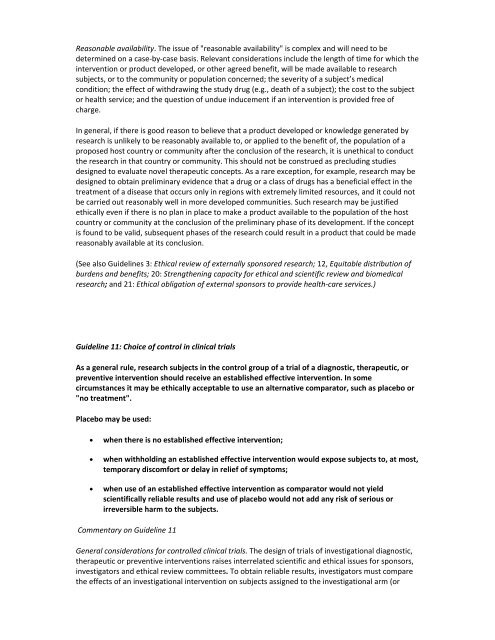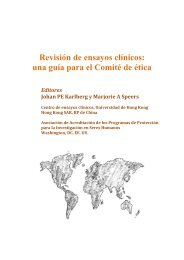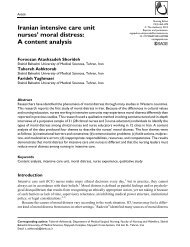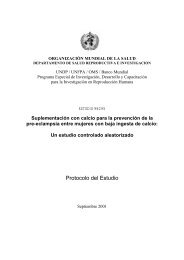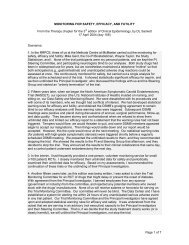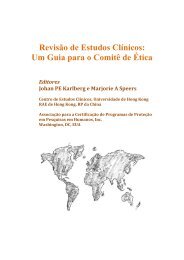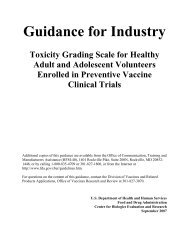Reasonable availability. The issue of "reasonable availability" is complex and will need to bedetermined on a case-by-case basis. Relevant considerations include the length of time for which theintervention or product developed, or other agreed benefit, will be made available to researchsubjects, or to the community or population concerned; the severity of a subject’s medicalcondition; the effect of withdrawing the study drug (e.g., death of a subject); the cost to the subjector health service; and the question of undue inducement if an intervention is provided free ofcharge.In general, if there is good reason to believe that a product developed or knowledge generated byresearch is unlikely to be reasonably available to, or applied to the benefit of, the population of aproposed host country or community after the conclusion of the research, it is unethical to conductthe research in that country or community. This should not be construed as precluding studiesdesigned to evaluate novel therapeutic concepts. As a rare exception, for example, research may bedesigned to obtain preliminary evidence that a drug or a class of drugs has a beneficial effect in thetreatment of a disease that occurs only in regions with extremely limited resources, and it could notbe carried out reasonably well in more developed communities. Such research may be justifiedethically even if there is no plan in place to make a product available to the population of the hostcountry or community at the conclusion of the preliminary phase of its development. If the conceptis found to be valid, subsequent phases of the research could result in a product that could be madereasonably available at its conclusion.(See also <strong>Guidelines</strong> 3: Ethical review of externally sponsored research; 12, Equitable distribution ofburdens and benefits; 20: Strengthening capacity for ethical and scientific review and biomedicalresearch; and 21: Ethical obligation of external sponsors to provide health-care services.)Guideline 11: Choice of control in clinical trialsAs a general rule, research subjects in the control group of a trial of a diagnostic, therapeutic, orpreventive intervention should receive an established effective intervention. In somecircumstances it may be ethically acceptable to use an alternative comparator, such as placebo or"no treatment".Placebo may be used:• when there is no established effective intervention;• when withholding an established effective intervention would expose subjects to, at most,temporary discomfort or delay in relief of symptoms;• when use of an established effective intervention as comparator would not yieldscientifically reliable results and use of placebo would not add any risk of serious orirreversible harm to the subjects.Commentary on Guideline 11General considerations for controlled clinical trials. The design of trials of investigational diagnostic,therapeutic or preventive interventions raises interrelated scientific and ethical issues for sponsors,investigators and ethical review committees. To obtain reliable results, investigators must comparethe effects of an investigational intervention on subjects assigned to the investigational arm (or
arms) of a trial with the effects that a control intervention produces in subjects drawn from thesame population and assigned to its control arm. Randomization is the preferred method forassigning subjects to the various arms of the clinical trial unless another method, such as historical orliterature controls, can be justified scientifically and ethically. Assignment to treatment arms byrandomization, in addition to its usual scientific superiority, offers the advantage of tending torender equivalent to all subjects the foreseeable benefits and risks of participation in a trial.A clinical trial cannot be justified ethically unless it is capable of producing scientifically reliableresults. When the objective is to establish the effectiveness and safety of an investigationalintervention, the use of a placebo control is often much more likely than that of an active control toproduce a scientifically reliable result. In many cases the ability of a trial to distinguish effective fromineffective interventions (its assay sensitivity) cannot be assured unless the control is a placebo. If,however, an effect of using a placebo would be to deprive subjects in the control arm of anestablished effective intervention, and thereby to expose them to serious harm, particularly if it isirreversible, it would obviously be unethical to use a placebo.Placebo control in the absence of a current effective alternative. The use of placebo in the controlarm of a clinical trial is ethically acceptable when, as stated in the Declaration of Helsinki (Paragraph29), "no proven prophylactic, diagnostic or therapeutic method exists." Usually, in this case, aplacebo is scientifically preferable to no intervention. In certain circumstances, however, analternative design may be both scientifically and ethically acceptable, and preferable; an examplewould be a clinical trial of a surgical intervention, because, for many surgical interventions, either itis not possible or it is ethically unacceptable to devise a suitable placebo; for another example, incertain vaccine trials an investigator might choose to provide for those in the ‘control’ arm a vaccinethat is unrelated to the investigational vaccine.Placebo-controlled trials that entail only minor risks. A placebo-controlled design may be ethicallyacceptable, and preferable on scientific grounds, when the condition for which patients/subjects arerandomly assigned to placebo or active treatment is only a small deviation in physiologicalmeasurements, such as slightly raised blood pressure or a modest increase in serum cholesterol; andif delaying or omitting available treatment may cause only temporary discomfort (e.g., commonheadache) and no serious adverse consequences. The ethical review committee must be fullysatisfied that the risks of withholding an established effective intervention are truly minor and shortlived.Placebo control when active control would not yield reliable results. A related but distinct rationalefor using a placebo control rather than an established effective intervention is that the documentedexperience with the established effective intervention is not sufficient to provide a scientificallyreliable comparison with the intervention being investigated; it is then difficult, or even impossible,without using a placebo, to design a scientifically reliable study. This is not always, however, anethically acceptable basis for depriving control subjects of an established effective intervention inclinical trials; only when doing so would not add any risk of serious harm, particularly irreversibleharm, to the subjects would it be ethically acceptable to do so. In some cases, the condition at whichthe intervention is aimed (for example, cancer or HIV/AIDS) will be too serious to deprive controlsubjects of an established effective intervention.This latter rationale (when active control would not yield reliable results) differs from the former(trials that entail only minor risks) in emphasis. In trials that entail only minor risks the investigativeinterventions are aimed at relatively trivial conditions, such as the common cold or hair loss;forgoing an established effective intervention for the duration of a trial deprives control subjects ofonly minor benefits. It is for this reason that it is not unethical to use a placebo-control design. Evenif it were possible to design a so-called "non-inferiority", or "equivalency", trial using an activecontrol, it would still not be unethical in these circumstances to use a placebo-control design. In any


